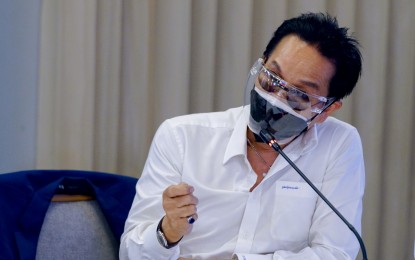
Chief Presidential Legal Counsel Salvador Panelo (Presidential Photo)
MANILA – Chief Presidential Legal Counsel Salvador Panelo slammed the “blatant and brazen” attempt of the International Criminal Court (ICC) to meddle in the Philippines’ domestic affairs, particularly its handling of the rampant illegal drug trade in the country.
This, after the ICC has formally authorized an official investigation into the alleged commission of crime against humanity associated with President Rodrigo Duterte’s anti-narcotics crackdown.
In a press statement on Thursday, Panelo maintained that the ICC has no and never had jurisdiction over the Philippines and its citizens.
“Our position concerning the proceedings before the International Criminal Court (ICC) remains. The foreign institution has no — as it never had — jurisdiction over the affairs of the Republic of the Philippines and its people,” he said.
Hence, the ICC’s latest move “neither bothers nor troubles the President and his administration,” Panelo said.
The ICC’s pre-trial chamber approved Wednesday the request of its former chief prosecutor, Fatou Bensouda, to authorize the full-blown probe into Duterte’s drug war even after the Philippines already cut ties with the international tribunal.
It said there was a “reasonable basis” to proceed with an investigation, given that the “specific legal element of the crime against humanity of murder” had been allegedly met in the anti-narcotics campaign.
Panelo said it was apparent that the ICC was bent on proceeding with a case against Philippine government officials, a move that is “in violation of our Constitution and in contravention with the Rome Statute that created it.”
He also questioned the timing of the ICC’s decision against the Duterte government, saying the international tribunal is being used as a “political and propaganda apparatus” by Duterte’s detractors “who will do anything to dethrone the President from his seat.”
“While we expect that more theatrics will be employed by the detractors of the President as election season draws near, this blatant and brazen interference and assault on our sovereignty as an independent country by the ICC is condemnable,” Panelo said.
He also lamented that the ICC decided to authorize a formal investigation into Duterte’s drug war more than two years after the Philippines revoked the Rome Statute that created the international court.
Citing Article 127 of the Rome Statute, Panelo said “there is no longer any matter for the ICC to pursue.”
“For this reason, there was nothing being criminally investigated by — or that was already under the consideration of — the ‘Court’ (which is not the same as an auxiliary office or chamber of the ICC) when said withdrawal took effect,” he said.
Panelo reiterated that the Rome Statute, being “penal” in nature, failed to comply with the publication requirement that affords due process to any countries that it wants to oversee.
“It is as if the said instrument never took effect in the country,” he said. “No wonder the leading and powerful countries of the world have either not joined it or have withdrawn their membership therefrom.”
Despite this, Panelo said the Philippine government was “able and willing” to prosecute anyone who abuses power and commits crimes against Filipino citizens, “if only genuine complainants come forward to the proper authorities instead of personalities who will use their plight for political ambitions.”
In March 2018, Duterte ordered the Philippines’ withdrawal from the Rome Statute after Bensouda continued with the preliminary examination into his anti-illegal drugs campaign in February of the same year.
The Philippines officially cut ties with the ICC on March 17, 2019, or exactly a year after the Rome Statute’s revocation.
Bensouda, whose term as ICC prosecutor ended on June 15 this year, had asked the court’s pre-trial chamber to allow the conduct of an investigation into Duterte’s drug war.
Sought for comment, the Department of the Interior and Local Government (DILG), which supervises the Philippine National Police (PNP), said it will heed President Rodrigo Duterte’s directive regarding the matter.
“The PNP is prepared for any investigation but this is a policy matter where only the President has the authority to decide whether to allow a non-local inquiry or not. Hence, we shall abide by the guidance of the President,” DILG Secretary Eduardo Año said in a message to reporters.
Meanwhile, the PNP said it is directly confronting allegations of human rights abuses and extra-judicial killings in the campaign against illegal drugs.
"In May this year, we strengthened our coordination and cooperation with the Department of Justice for the review of our illegal drugs operations, particularly those which we deemed to have violated our Police Operational Procedures and including those which resulted in deaths and injuries of the subjects of the operations. At least 53 case folders have already been turned over to the DOJ for further review and possible prosecution," PNP chief, Gen. Guillermo Eleazar said in a statement.
Eleazar added that all police commanders have already been instructed to immediately submit after-operation reports of all illegal drugs-related operations, adding that these are all being verified by the Internal Affairs Service through its motu propio investigation power.
"These are all part of our efforts to strengthen transparency and accountability in the conduct of our operations amid various allegations that have been hounding the police organization in the last five years," he added. (with Lloyd Caliwan/PNA)
